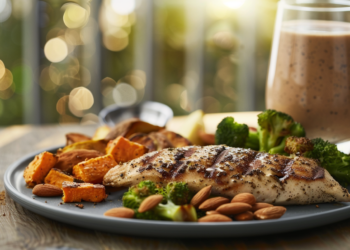Understanding the strategic timing of meals and supplements is crucial for effective fat loss and overall health. Start with a balanced breakfast to kickstart metabolism and manage hunger. Before working out, consume a mix of carbohydrates and protein for energy and muscle support. Post-workout, prioritize protein and carbs for recovery. Supplement timing can enhance metabolism and aid in weight management. Opt for nutrient-dense evening meals with lean protein and complex carbs. Choose high-protein, fiber-rich bedtime snacks to promote satiety. Knowing when to eat and supplement can optimize fat loss. Find out more to optimize your fat loss journey.
Key Takeaways
- Prioritize balanced meals with protein, carbs, and fats for fat loss support.
- Time pre-workout nutrition 1-2 hours before exercise for optimal energy.
- Consume post-workout meal rich in protein and carbs within 30 minutes to 2 hours post-exercise.
- Strategically use supplements like caffeine and BCAAs to enhance fat loss efforts.
- Opt for nutrient-dense evening meals and high-protein bedtime snacks for weight management.
Importance of Meal Timing
Understanding the significance of meal timing is crucial for optimizing fat loss and overall health. When it comes to breakfast, the benefits extend beyond simply breaking the overnight fast. Eating a balanced breakfast rich in protein, fiber, and healthy fats kickstarts your metabolism, provides sustained energy levels, and can help reduce overall calorie intake throughout the day. Studies show that those who regularly consume breakfast are more likely to maintain a healthy weight and make better food choices.
Moving on to lunch timing, it's essential to consider when to have your midday meal for optimal results. Eating lunch earlier in the day, around noon, can help regulate hunger hormones, leading to better appetite control and potentially reducing the risk of overeating later in the day. Additionally, having a well-rounded lunch with a good balance of macronutrients can sustain energy levels and focus throughout the afternoon, preventing the dreaded post-lunch energy slump. By being mindful of both breakfast benefits and lunch timing, you can set yourself up for success in achieving your fat loss goals while supporting your overall health.
Pre-Workout Nutrition Strategies
Let's now address effective strategies for pre-workout nutrition to optimize performance and fuel fat loss goals. Nutrient timing plays a crucial role in maximizing workout effectiveness and supporting fat loss efforts. Before a workout, it's essential to consume a balanced meal or snack that provides the necessary energy sources for the upcoming physical activity. Carbohydrates are a primary energy source for exercise, providing fuel for muscles and enhancing performance. Including a moderate amount of protein in the pre-workout meal can help with muscle repair and growth.
Timing is key when it comes to pre-workout nutrition. Consuming a meal or snack containing carbohydrates and protein about 1-2 hours before exercising allows for proper digestion and absorption of nutrients, ensuring they're available when needed during the workout. Additionally, staying hydrated before a workout is vital for optimal performance. It's advisable to avoid high-fat foods close to the workout session, as they may lead to discomfort during exercise. By strategically planning your pre-workout nutrition, you can enhance your workout performance and support your fat loss goals.
Post-Workout Meal Timing
When should we ideally consume our post-workout meal to optimize recovery and muscle growth after exercise? The timing of our post-workout meal plays a crucial role in maximizing the benefits of our training session. Consuming a meal rich in protein and carbohydrates within 30 minutes to 2 hours post-exercise can enhance recovery benefits and muscle protein synthesis. Research suggests that this window of time is optimal for replenishing glycogen stores and promoting muscle repair and growth.
In terms of macronutrient ratios, a good post-workout meal should ideally contain a mix of protein and carbohydrates in a ratio of around 1:3 or 1:4. Protein is essential for muscle repair and growth, while carbohydrates help replenish glycogen stores and support recovery. Including some healthy fats can also be beneficial for overall nutrient absorption and hormonal balance.
Supplement Timing for Fat Loss
To optimize fat loss effectively, strategic timing of supplements can play a crucial role in enhancing metabolic processes and supporting weight management goals. When it comes to supplement timing for fat loss, there are key strategies to consider:
- Pre-Workout Supplementation: Consuming supplements like caffeine or green tea extract 30-60 minutes before your workout can help increase energy levels and fat oxidation during exercise, leading to greater calorie burn.
- Intra-Workout Support: Including branched-chain amino acids (BCAAs) or electrolyte supplements during your workout can help preserve muscle mass and hydration levels, which are essential for maintaining metabolic rate and performance.
- Post-Workout Recovery: Timing your post-workout protein shake with fast-digesting protein sources like whey protein within 30 minutes after exercise can support muscle recovery and growth, ultimately boosting your metabolism over time.
Evening Meal Suggestions

For optimal fat loss results, incorporating nutrient-dense and balanced evening meals is crucial in supporting metabolic processes and promoting weight management goals. When planning your evening meal, opt for nutritious options that include lean proteins, such as grilled chicken or tofu, complex carbohydrates like quinoa or sweet potatoes, and a variety of colorful vegetables. These nutrient-rich foods provide essential vitamins, minerals, and antioxidants that support overall health and metabolism.
To help control portion sizes and prevent overeating at night, consider using smaller plates, measuring out appropriate serving sizes, and focusing on eating slowly to allow your body to signal when it's full. Avoid heavy, calorie-laden dishes that may disrupt your body's natural sleep patterns and hinder fat loss efforts. Instead, prioritize whole foods that are high in fiber and protein to keep you feeling satisfied and energized throughout the evening.
Optimizing Bedtime Snacks
In optimizing bedtime snacks for supporting fat loss goals, selecting nutrient-rich options that are both satisfying and light on calories is key. When choosing late-night options for a bedtime snack, it's crucial to consider portion control to prevent excess calorie intake close to bedtime.
Here are three essential tips to optimize bedtime snacks for fat loss:
- Choose High-Protein Snacks: Opt for snacks that are rich in protein, such as Greek yogurt, cottage cheese, or a small portion of turkey slices. Protein helps promote satiety levels and supports muscle maintenance during the night.
- Incorporate Fiber: Including fiber-rich foods like fruits, vegetables, or whole grains can help keep you feeling full longer without adding excessive calories. This nutrient balance aids in preventing overeating and unnecessary snacking before bed.
- Mindful Snacking: Practice mindful eating habits by being aware of portion sizes and choosing snacks that provide a mix of macronutrients. This approach can help satisfy cravings while supporting your fat loss goals.
Frequently Asked Questions
Can Intermittent Fasting Be Effective for Fat Loss When Combined With Specific Meal and Supplement Timing Strategies?
Intermittent fasting, when paired with strategic meal and supplement timing, can enhance fat loss. The benefits of fasting include improved insulin sensitivity and increased fat oxidation. However, drawbacks may include potential muscle loss and difficulty adhering to strict eating windows.
Are There Any Specific Meal Timing Strategies That Are More Effective for Individuals With Different Body Types or Metabolic Rates?
We find that tailoring meal timing to individual body composition and metabolic differences yields optimal results. Understanding these factors allows for personalized strategies that enhance fat loss. Effective timing can be a key component in achieving desired outcomes.
How Important Is It to Adjust Meal and Supplement Timing When Following a Calorie-Restricted Diet for Fat Loss?
Adjusting meal and supplement timing on a calorie-restricted diet for fat loss is crucial. Consistent timing supports metabolism, regulates insulin levels, and optimizes nutrient absorption. Varying meal frequency strategically can enhance weight loss results and overall health.
Is It Beneficial to Incorporate Fasting Periods or Extended Periods of Time Between Meals for Optimizing Fat Loss Results?
Optimizing fat loss results can benefit from incorporating fasting periods and adjusting meal frequency. Research supports the benefits of fasting for weight management. Strategically spacing meals can enhance metabolism and aid in achieving weight loss goals efficiently.
Are There Any Specific Supplements or Ingredients That Should Be Avoided or Minimized in Order to Maximize the Effects of Meal Timing for Fat Loss?
When aiming to maximize the effects of meal timing for fat loss, it's crucial to avoid stimulants and minimize sugars. These substances can interfere with the body's natural processes and potentially hinder weight loss efforts.
Conclusion
In conclusion, timing your meals and supplements strategically can significantly impact your fat loss journey. Remember to focus on pre and post-workout nutrition, choose supplements wisely, and consider evening meal options and bedtime snacks that support your goals.
Consistency is key, so stick to your plan and watch those pounds melt away. Stay smart, stay satisfied, and stay slim with savvy meal and supplement timing.













